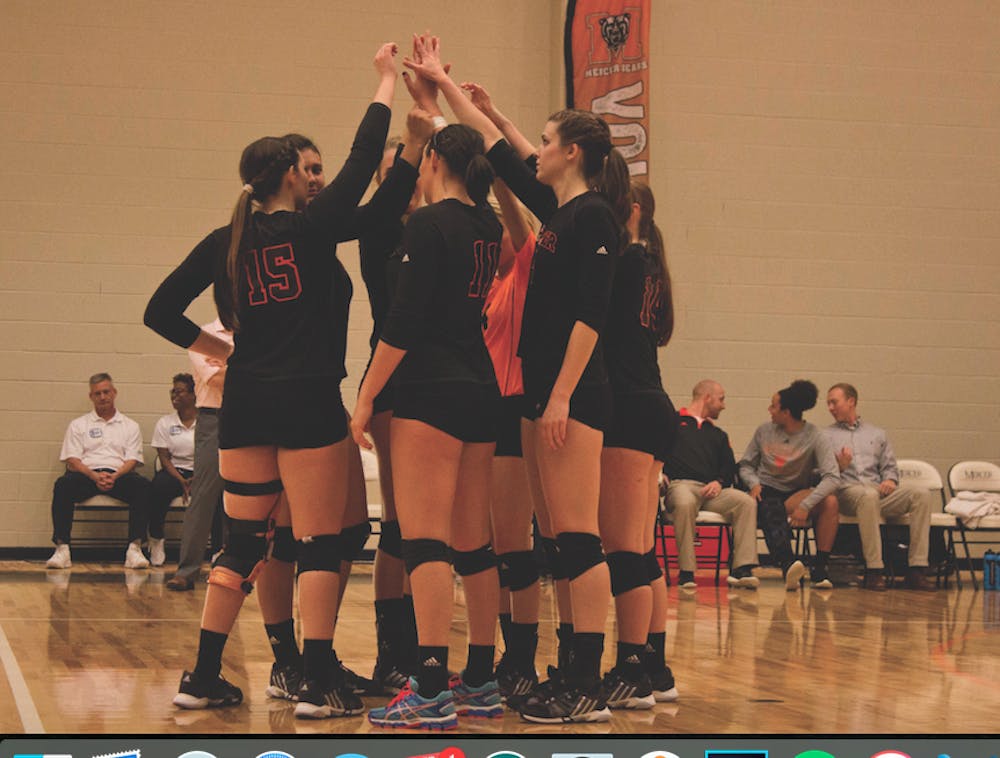Three weeks into the 2015 Southern Conference volleyball season, three of Mercer’s volleyball players were already out with concussions. When one thinks “concussion,” volleyball is probably not the sport that immediately comes to mind. High-contact sports such as football and soccer are notorious for causing concussions, and get much more media attention as a result.
“Compared to other sports, volleyball has a fairly low occurrence of concussions typically. [However], concussion awareness and prevention should be considered a priority for all sports,” said Mercer University’s Assistant Athletic Trainer Brad Crowe. Crowe said that volleyball more commonly leads to “injuries to the shoulder, knees, and ankles;” the most common being ankle sprains.
“With the repetitive nature of swinging [and jumping] to hit, tendinitis and other overuse injuries of the shoulder and knee are also common,” Crowe said.
However, this does not mean that concussions should be ignored.
“Contact sports receive all the attention for concussions and we learn how to mitigate the risk for those, but the non-contact sports are at risk as well,” said Graduate Assistant Athletic Trainer Raquel Warrick, “While it is less difficult to control concussions in football simply by changing the way you tackle, it is not as easy for volleyball so we need to be taking precautions for this.”
So far, determining how to prevent concussions in volleyball has proven tricky.
Mercer volleyball team captain Tori Penrod is one of the players who has sustained a concussion this season. Penrod would not be considered at high risk for the events leading up to a concussion. As a libero, her role on the team is limited to the back row, safe from the net action that seems more likely to cause a head injury. But during one of the team’s practices, Penrod dove for the same ball as one of her teammates. It ricocheted off of the girl’s arms and pegged Penrod in the face. After sustaining her concussion, Penrod was unable to practice with her team for the following week.
When asked if she felt comfortable admitting to her concussion, Penrod conceded that she had felt some hesitation initially.
“There is definitely a moment of hesitation because you work hard each day to win a championship. The competitor in you tries to push through injuries, but eventually it comes to the point where you have to pull yourself out of the game.”
Warrick works specifically with the volleyball team to keep athletes healthy and injury-free. Warrick believes that athletes “feel that they are letting their coach and/or team down if they report a concussion because they know they will have to sit out.” Both internal and external pressures not to report suspected injuries, especially concussions, are seen across the board in athletics. But with the media attention concussions have been receiving of late, there is hope that concussion awareness will begin to increase.
“With ongoing research regarding the long-term effects of concussions, many changes are being made to the professional level of games. Hopefully, as is usually the case, these new changes will work their way down to the NCAA and high school levels,” Crowe said.
Currently, the NCAA “requires that all student-athletes view a concussion awareness video prior to the beginning of activity,” Crowe said.
“Prior to participation in activity, all Mercer student-athletes complete baseline concussion testing to try to show how their brain functions under normal conditions.” Following a head injury, an athlete “completes the same concussion testing and is referred to the Mercer team physician for examination. Once a concussion is diagnosed, they are removed from all activity until their concussion symptoms have subsided,” Crowe said.
“Once they are cleared,” Warrick said, “they begin a gradual exertional protocol, starting with light exercise then working their way up to heavy exercise to non-contact, and then full practice.”
Despite the vigilance practiced by NCAA athletic training personnel, concussions will inevitably persist in all sports, including volleyball. After all, it is the thrill of a hard-driven hit or an impressive dig that makes the game of volleyball so enjoyable and stimulating to athletes. However, recent research has proved just how damaging concussions can be to long-term health, and the more seriously we treat them, the more likely student-athletes will be to succeed after their glory days of Division I athletics have come to an end.
Concussions cause problems for volleyball team





